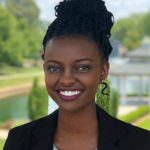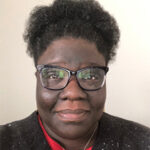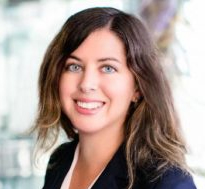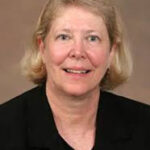We’ve invited recipients of 2019 and 2020 NCTE awards to reflect on how the current pandemic is affecting their teaching—the challenges, concerns about their students, surprises and discoveries, strategies that help them cope, and things that give them hope. Responses received so far have been vibrant and varied; some will appear in Literacy & NCTE blog posts and some in fall issues of The Council Chronicle.
Included in this post are comments from Brianna Burnette, Erika Johnson, Nicole Mirra, Jonathan Smilges, and Kathleen Blake Yancey.
 Brianna Burnette (2019 Early Career Educators of Color Leadership Award) is a fourth-grade teacher at Mary H. Wright Elementary school in Spartanburg, South Carolina. She graduated from Furman University with a bachelor’s in elementary education and a minor in African American studies and African diaspora cultures and is pursuing a master’s in education with a concentration in literacy.
Brianna Burnette (2019 Early Career Educators of Color Leadership Award) is a fourth-grade teacher at Mary H. Wright Elementary school in Spartanburg, South Carolina. She graduated from Furman University with a bachelor’s in elementary education and a minor in African American studies and African diaspora cultures and is pursuing a master’s in education with a concentration in literacy.
The main professional challenge I’m anticipating is establishing strong relationships and communication with my students and their parents during the school year. In the elementary classroom, young students thrive and rely heavily upon maintaining positive relationships with their teachers because it supports and builds on trust and connections. Establishing personal relationships with students and their parents is such an important thing to me as an educator because it helps to enhance students’ learning experiences.
I’m most concerned about the mental and physical well-being of my students returning in the fall. Although our teachers and district did a wonderful job to support student instruction virtually, it was a hard adjustment to reach, teach, and continue the relationships that I established with my students due to lack of access. Also, in our state of South Carolina, people are anxious to return in person to the classrooms, but the COVID cases have skyrocketed and I fear that if we return to school in person that it’ll only put our students and educators at further risk.
I was very impressed with how much parent participation increased when the schools shut down. Since many of the parents were quarantined at home, they had more time to invest in their child’s education. Parents participated in readalouds and inquiry-based experiments with their children which was amazing to support and see.
Self-care is very important to me, so I found it helpful to start exercising more as a stress reliever. I also maintained consistent communication with other educators to build and support each other throughout this global pandemic.
I’m hopeful that my students will have a great learning experience regardless if it’s virtual or in the classroom. I want to make sure that our classroom will remain a strong and positive platform and outlet for my students to amplify and utilize their voices as lifelong learners.
I cannot predict what teaching will look like in the future, but I’ve seen educators work tirelessly without warning to make sure that our students received all of the support they need as children both physically, emotionally, and academically, which is the most important thing at the end of the day.
 Erika Johnson (2019 Early Career Educators of Color Leadership Award) is an assistant professor of literacies and composition at Utah Valley University. She earned a doctoral degree in rhetoric and a graduate certificate in multicultural women’s and gender studies at Texas Woman’s University in Denton, Texas. Her pedagogy and research focus is the marginalization of basic writing, visual rhetoric, and multiple literacies with specific attention to digital literacies, and gender studies.
Erika Johnson (2019 Early Career Educators of Color Leadership Award) is an assistant professor of literacies and composition at Utah Valley University. She earned a doctoral degree in rhetoric and a graduate certificate in multicultural women’s and gender studies at Texas Woman’s University in Denton, Texas. Her pedagogy and research focus is the marginalization of basic writing, visual rhetoric, and multiple literacies with specific attention to digital literacies, and gender studies.
One of my main professional challenges, and I think part of this is a challenge for all of higher education right now, is the effective facilitation of all online sections of courses I teach whilst still working on my ECEOC project.
Many of my Basic Composition students don’t have regular or reliable internet access. Historically, socioeconomic factors and race often dictate the placement of students in the courses I teach, and even though I teach at a predominantely white institution (PWI), lack of digital technology knowledge or access, among additional reasons, remains a significant part of why students are placed into Basic Composition. Increasing the number of online sections is a necessary health and safety precaution, but ensuring students are not left out or left behind solely because of increased digital technology use is a concern. My department, college, and university are all taking this concern seriously, to mitigate the effects as much as humanly possible.
Unfortunately, a sad and disappointing surprise brought on by the pandemic is the realization of how many people in this country do not care about other people.
I am finding regular Zoom or Teams lunch meetings with colleagues and friends to be valuable as self-care or coping strategies. Talking about teaching or just checking in with each other has been helpful in coping with the stress of not knowing how courses would be managed in the fall, including issues like social distancing in classrooms, the requiring of face masks, the need for disinfecting classrooms, and a host of additional issues.
I am hopeful about finding new ways to facilitate effective online delivery of classroom instruction. I also have hope that in finding [these,] we are able to attract more potential students, who, for whatever reasons, could not matriculate because classes they needed or wanted were only offered in person. Because of the increase in online classes and online sections of some classes, there is an opportunity to attract students for whom the physical classroom was always out of reach, just because it was a physical classroom.
 Nicole Mirra (2019 David H. Russell Award for Educating for Empathy: Literacy Learning and Civic Engagement) is an assistant professor of urban teacher education at Rutgers, The State University of New Jersey. Her teaching and research focuses on the intersections between critical literacy and civic engagement across multiple contexts, including urban secondary English classrooms, grassroots youth organizations, and digital learning communities.
Nicole Mirra (2019 David H. Russell Award for Educating for Empathy: Literacy Learning and Civic Engagement) is an assistant professor of urban teacher education at Rutgers, The State University of New Jersey. Her teaching and research focuses on the intersections between critical literacy and civic engagement across multiple contexts, including urban secondary English classrooms, grassroots youth organizations, and digital learning communities.
I anticipate that the most daunting challenge I will face this fall will be the inability to maintain a consistent rhythm or flow throughout the semester. One of my favorite feelings in teaching is the “groove” that my students and I reach at a certain point during a class—the time when relationships, comfort, and stability have been established and our learning is firing on all cylinders. This fall, the uncertainties that continue to be created by the pandemic will likely disrupt teaching schedules, impact health and safety, and necessitate zigs and zags to adjust to changing circumstances. This churns up anxiety for me (and likely will for my students) and so I’m trying to think about ways to flow with new unconventional rhythms.
I teach preservice teachers and I am deeply concerned not only about their physical and emotional health and well-being, but also about the lack of in-person contact that they will have with students for the foreseeable future. Fieldwork will be conducted virtually for now, and while this will offer valuable lessons in flexibility and rigorous hybrid/online instruction, I am worried about what it means to learn to become a teacher without the magic of working with young people in a physical classroom. As a teacher-educator, this forces me to think carefully about how to support the development of meaningful student-teacher relationships in innovative ways.
I am consistently in awe of how creative and resilient young people and their teachers have been in the face of unimaginable adversity. I often write about the concept of “pragmatic idealism”—the idea that teaching and learning should start from a place of dreaming and possibility and then leverage that spirit to take on any constraints or barriers that emerge along the way. And I have seen that spirit as teachers have connected with their learners using any means at their disposal and young people have demonstrated their learning through community-based and digital outlets.
As someone who yearns to plan ahead and control my circumstances as much as possible, I have been challenged by the current uncertainties to learn better strategies for living in the moment and accepting unpredictability. I constantly remind myself of the need to “flow like water” and for me, taking breaks from the computer and shifting focus from my mind to my body through running, walking, and yoga have been helpful. I also value phone calls and virtual meet-ups with friends who remind me that our connections are still strong even when we are physically apart.
I am filled with hope by the idea, which I first encountered in an essay by author Arundhati Roy, that the pandemic is a portal. While it is certainly causing pain and uncertainty, it is also offering opportunities for us to imagine and realize new paradigms of education and shared life on this planet—as long as we are courageous enough to do so. So many practices and structures in education in “normal times” had long been perpetuating inequity and now that “normal” is no more, we can build more inclusive and expansive designs in their place. While it is tempting to long for the familiar, I am excited by the ideas that emerge when teachers and young people lean into the strange and experiment with transforming education.
I believe that the push for online education will continue to reshape higher education and I am wondering about what it means for teaching and learning when students (and faculty) are no longer necessarily physically connected to the college or university they attend. I’m not sure yet how to process this but it feels significant.
 Jonathan Smilges (2020 Lavender Rhetorics Award for Excellence in Queer Scholarship—Article) is an assistant professor of English and affiliate faculty of women’s studies at Texas Woman’s University, Denton.
Jonathan Smilges (2020 Lavender Rhetorics Award for Excellence in Queer Scholarship—Article) is an assistant professor of English and affiliate faculty of women’s studies at Texas Woman’s University, Denton.
This fall I’ve started as an assistant professor of English at Texas Woman’s University, which means I am starting fresh at a new institution in a new department located in a new state with new responsibilities, colleagues, and students. All of this newness, while exciting, is overwhelming. I am anticipating that my main professional challenge will be one of adjusting, of settling in, and of trying to maintain a sense of stability in the face of seemingly endless change.
I am most concerned about students’ safety, not only from COVID-19 directly but also from the various forms of harm that many students face while living at home or off campus. Though I wholly support campuses not reopening this fall (or even all next year), I continue to worry about poor students, queer and trans students, and disabled students, who are all more likely to go without the resources, care, and accommodations they need to survive, let alone learn. I worry about Black students, especially those who are also poor, queer, trans, or disabled, and who will soon be expected to resume their studies, likely without much or any institutional support for mental health services—services that could assist in processing the grief and trauma linked to months of protests against the police and carceral system, to decades of spectacularized murders of Black people, and to four hundred years of anti-Black violence in this country. I suspect that this upcoming year will reveal more clearly than ever that the role of “student” has never been, nor will ever be, separable from any given student’s material and embodyminded conditions.
I have been surprised and encouraged by the radicalization of so many students and faculty, as evidenced by their social media use and participation in protests and other community events responding to the murders of Black people, including George Floyd, Ahmaud Arbery, Breonna Taylor, and Tony McDade. It is good to see, finally, White faculty standing up and speaking out for their Black colleagues and students. Though I think there are good reasons to be suspicious of the sincerity and longevity of this apparently widespread radicalization, it has nevertheless been a testament to the pedagogical skill of Black educators and organizers, especially Black women, who have until now been working by and large without institutional or public support.
As a disabled person, I am accustomed to recognizing and honoring my embodyminded limits, to saying, “No, I can’t do that,” or, “Not right now, maybe later.” Taking the time to pause, rest, and recharge—to sleep, watch television, have sex, cuddle the dog, bake some cookies—is not only important but indispensable for avoiding burnout. Yet, I have also been spending a lot of time recently reflecting on the ways a person’s relationships to power and subjection, their experiences of privilege and oppression, render self-care more available and accessible to some than others. That is, I am trying to be intentional about ensuring my self-care (and any abdication of responsibilities that such self-care entails) doesn’t place unnecessary labor on someone else, especially someone who might need care/self-care even more urgently than me.
Most students want to effect positive change in the world, even if they don’t know how or where to direct their energy. I am hopeful that this past year will offer the grounds for any number of conversations and lessons that will mobilize students to do the work that needs to be done. The world is burning—literally and figuratively—and while higher education will never be the singular solution, I am excited to empower students with every tool I have available to make their lives and the lives of those around them more livable.

Kathleen Blake Yancey (2019 James R. Squire Award) is the Kellogg W. Hunt Professor of English at Florida State University in the rhetoric and composition program. The author of numerous books and articles, her scholarship includes composition studies, writing knowledge, creative nonfiction, and writing assessment. She has served as an elected leader for several professional/scholarly organizations, including NCTE.
What would you name as a surprise or unexpected discovery from this challenging year?
- that because of the affordances of digital networked technology, at least for those with access, we’re not social distancing at all; we are physically distancing (I hope!), but in fact we are engaging more than ever socially, even if it may be somewhat differently than before.
- that we can address the pandemic, social justice issues, and the economy concurrently, and that addressing only one or two of these without addressing all of them will produce an incomplete recovery.
- that my students love their pets, especially dogs, and were eager to bring them to Zoom class; our classes became more personal, human, and shared as they did so.
What self-care or coping strategies are you finding most valuable this year?
- simple things: finding a quiet moment; reading a print book before I go to sleep; making puzzles and creating illustrated letters for my grandchildren.
What makes you the most hopeful?
- the resilience of teachers and students; the persistence, intelligence, and wisdom of leaders like Dr. Fauci; the many ways we’ve adapted and adjusted to what my friend Irwin Weiser calls “the new abnormal.”
What are your thoughts on how teaching may change permanently as a result of the pandemic?
- My own sense is that this situation provides us with an opportunity to learn. So the way I’d frame the situation is to ask, what is it about learning and teaching that this new situation makes available for us? Yesterday I did a four-hour workshop for 30+ participants: we used many features of the digital platform—polling, chat, slides, and break-out rooms—and it went well. Participants loved raising issues in the chat; in fact, they raised issues as I was talking, so I would pause and reply to them; they didn’t see talking in the chat as a kind of interruption, but students don’t ordinarily interrupt in that way in the F2F class. Because of the questions in the chat and my response to them, the class was especially interactive. Participants also shared in multiple ways after engaging in small-group work in the break-out rooms; and they raised lots of questions. Overall, participants engaged in many different ways—speaking, listening, gesturing, and writing: the workshop, in other words, was fully interactive and multimodal. I wonder how we can assure that all classes—F2F, online, remote, hybrid, and hyflex—are fully multimodal and interactive, and I also wonder how such multimodality and interactivity vary across means of delivery! The classical rhetoricians knew delivery was important, and we’re learning various new and exciting ways of making it so in both F2F and online classrooms.
It is the policy of NCTE in all publications, including the Literacy & NCTE blog, to provide a forum for the open discussion of ideas concerning the content and the teaching of English and the language arts. Publicity accorded to any particular point of view does not imply endorsement by the Executive Committee, the Board of Directors, the staff, or the membership at large, except in announcements of policy, where such endorsement is clearly specified.

